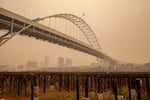
In this file photo pictured on Sept. 10, 2020, smoke obscures the hills and buildings normally visible in downtown Portland.
Claudia Meza / OPB
Elderly, disabled and low-income Oregonians are disproportionately exposed to wildfires, according to a new study published in Science Advances.
Researchers looked at communities across Oregon, Washington state and California who were caught in the perimeters of wildfires. In Oregon, they found that nearly half of those people had high social vulnerability.
The study’s definition of social vulnerability included socioeconomic status, disability, housing and language abilities. When a wildfire strikes, it may be harder for these groups to adapt or rebuild, according to UC Merced Professor John Abatzoglou.
“Affluent communities do have the financial means to build defensible space,” said Abatzoglou, “whereas those people with limited financial means or less than optimal health status are going to face larger impacts.”
Related: Washington state endures ‘catastrophic’ 2023 wildfire season with high ignitions, property loss
Additionally, the study found that as wildfires became more common due to climate change, vulnerable communities in Oregon were more likely to feel the effects than other groups.
“We need to find ways to help those individuals living in fire prone environments cope with fire,” said Abatzoglou. “It’s not a question of whether fire will happen. It’s a question of when it will happen.”
Related: Wildfire season continues despite rain in Southern Oregon and Northern California
Oregon State University Professor Erica Fleischman, who contributed to the research, said the study’s findings could help guide government resources to the communities where they’d be the most helpful.
“Different communities have different risk factors, different assets, and different priorities,” she said. “But this provides some underlying information about those risk factors that can help jumpstart those direct discussions.”
Among those affected by wildfires in Oregon, age, financial and disability vulnerabilities were more common than language and housing issues.